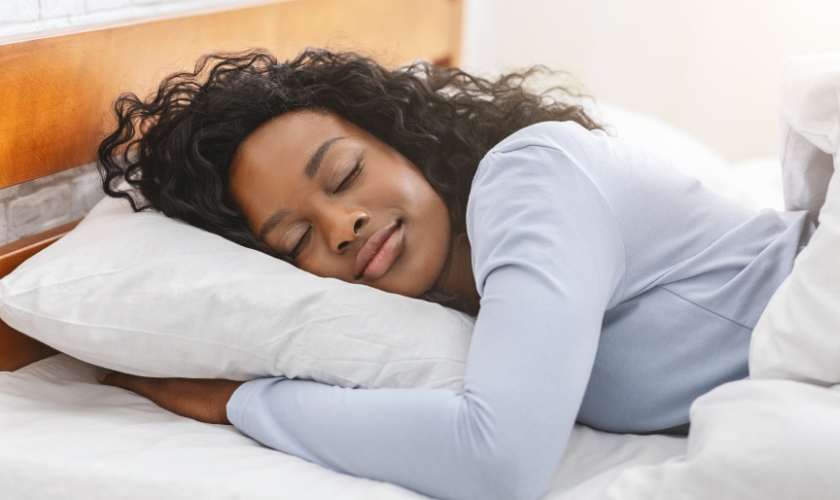Kentwood, MI

5 Ways of Better Natural Sleep: Achieve Restful Sleep Tonight!

Sleep is not a passive state of being. It’s a vital physiological process essential for our physical and mental health. During sleep, our bodies repair tissues, consolidate memories and regulate hormones.
There are four main stages of sleep:
Non-rapid eye movement (NREM) sleep: NREM sleep has three stages with progressively slower brain waves and muscle activity.
- NREM 1: The lightest sleep stage, where we can be easily awakened.
- NREM 2: A deeper sleep stage where our heart rate and breathing slow down.
- NREM 3 (Deep sleep): The deepest sleep stage crucial for physical restoration and memory consolidation.
Rapid eye movement (REM) sleep: REM sleep is characterized by rapid eye movements, increased brain activity, and muscle paralysis (except for the eyes and diaphragm). This is the stage when dreaming often occurs.
These sleep stages cycle throughout the night, with NREM sleep dominating the first half and REM sleep becoming more prominent in the latter half.
Common Sleep Problems and Their Causes
Millions of people struggle with various sleep disorders that disrupt their sleep quality and leave them feeling exhausted. Here’s a look at some common sleep problems:
- Insomnia: Difficulty falling asleep, staying asleep, or both. Stress, anxiety, medical conditions, and certain medications can contribute to insomnia.
- Sleep apnea: A condition where breathing repeatedly stops and starts during sleep, leading to fragmented sleep and daytime fatigue.
- Restless leg syndrome (RLS): An irresistible urge to move the legs, often accompanied by uncomfortable sensations, that worsens at night and disrupts sleep.
- Circadian rhythm disorders: Disruptions to the body’s natural sleep-wake cycle, often caused by jet lag, shift work, or changes in light exposure.
These are just a few sleep disorders. If you suspect you have a sleep problem, consult a healthcare professional for proper diagnosis and treatment.
Natural Sleep Remedies
Even minor adjustments to your daily routine and habits can significantly improve your sleep quality. Here are some natural sleep remedies you can incorporate into your life:
Establish a Relaxing Sleep Schedule and Routine:
- Go to bed and wake up at consistent times each day, even on weekends. This helps regulate your body’s natural sleep-wake cycle (circadian rhythm).
- Create a relaxing bedtime routine that signals to your body it’s time to wind down. This could include taking a warm bath, reading a book, or practicing light stretches.
Create a Sleep-Conducive Environment:
- Temperature: Aim for a cool bedroom temperature between 60-67°F (15-19°C) for optimal sleep.
- Light: Darkness is essential for sleep. Blackout curtains, an eye mask, and turning off electronic devices before bed can minimize light exposure.
- Noise: Minimize disruptive noises with earplugs, a white noise machine, or soundproofing measures.
Develop a Calming Pre-Sleep Ritual:
- Avoid stimulating activities like watching TV or working on your computer close to bedtime.
- Engage in relaxing activities like taking a warm bath, reading a calming book, or practicing gentle yoga or meditation.
- Deep breathing exercises: Focus on slow, deep breaths to calm your mind and body before sleep.
- Progressive Muscle Relaxation: Tense and relax different muscle groups progressively to release tension and promote relaxation.
Power Down From Electronics Before Bed:
- The blue light emitted by electronic devices like phones, laptops, and tablets can suppress melatonin production, a hormone that regulates sleep.
- Power down electronics at least an hour before bed, or use blue light filter settings.
Optimize Your Diet and Exercise Habits for Sleep:
- Diet: Avoid heavy meals, sugary drinks, and caffeine close to bedtime, as they can disrupt sleep.
- Exercise: Regular physical activity can improve sleep quality. However, avoid vigorous exercise too close to bedtime, as it can be stimulating.
- Consider sleep-promoting foods: Tart cherry juice, kiwi fruit, and certain nuts are rich in melatonin or sleep-supportive nutrients.
Natural Sleep Aids
While natural remedies are a great first line of defense for sleep issues in Kentwood, sometimes a little extra help can be beneficial. Here are some natural sleep aids to consider:
Melatonin: The Science Behind the Sleep Hormone
Melatonin is a hormone produced by the body that helps regulate sleep-wake cycles. Production naturally increases in the darkness and decreases with exposure to light.
Melatonin supplements are readily available and may be helpful for:
- Adjusting to jet lag
- Shift workers with disrupted sleep schedules
- People with occasional sleep problems
Things to consider about melatonin supplements:
- Melatonin is not a sleeping pill and won’t knock you unconscious.
- It can take a few weeks of consistent use to see the full benefits.
- The optimal dosage can vary depending on individual needs. Consult your doctor before taking melatonin supplements, especially if you are on medications or have underlying health conditions.
Essential Oils for Sleep and Relaxation
Aromatherapy involves using essential oils extracted from plants to promote relaxation and well-being. Some essential oils, like lavender and chamomile, have calming properties that may be beneficial for sleep.
Here’s how to use essential oils for sleep:
- Diffuse a few drops of essential oil in a diffuser before bed.
- Add a few drops to a warm bath.
- Dilute with a carrier oil (like almond oil) and apply a small amount to your temples or wrists.
Important note: Essential oils are potent and can irritate the skin. Always dilute them properly before use and perform a patch test on a small area of skin before applying them topically.
Relaxation Techniques for Better Sleep
Relaxation techniques can help quiet a racing mind and prepare your body for sleep. Here are a few techniques to consider:
- Deep breathing exercises: Focus on slow, deep breaths from your diaphragm to activate the relaxation response.
- Progressive muscle relaxation: Tense and relax different muscle groups progressively to release tension throughout your body.
- Mindfulness meditation: Focus your attention on the present moment and let go of worries or anxieties that may be keeping you awake.
Addressing Specific Sleep Concerns
Everyone experiences occasional sleep disruptions. Here are some tips to target specific sleep problems:
Difficulty Falling Asleep:
- Avoid napping during the day: Long daytime naps can make it harder to fall asleep at night.
- Get out of bed if you can’t fall asleep after 20 minutes: Don’t lie in bed awake for extended periods. Engage in a relaxing activity until you feel tired, then return to bed.
- Write down your worries: If worries are keeping you awake, jot them down on paper to clear your mind.
Waking Up During the Night:
- Avoid checking the clock: The glowing light and time awareness can make it harder to fall back asleep.
- Practice relaxation techniques: Deep breathing or progressive muscle relaxation can help you return to sleep.
- Limit bathroom trips: Avoid consuming excessive fluids close to bedtime to minimize night time bathroom breaks.
Early Morning Awakening:
- Don’t hit the snooze button: This can disrupt your sleep cycle and leave you feeling more tired.
- Get some sunlight exposure in the morning: This helps regulate your circadian rhythm and promotes daytime wakefulness.
- Review your sleep schedule: Make sure your bedtime and wake-up times are consistent, even on weekends.
Shift Work and Sleep:
- Stick to a consistent sleep schedule as much as possible, even on off days. This helps minimize the disruption to your circadian rhythm.
- Adjust light exposure strategically: Expose yourself to bright light during your waking hours and minimize light exposure before bedtime.
- Plan for naps: Short naps during breaks can help improve alertness during long shifts. However, avoid napping too close to bedtime.
Remember, consistency is key when addressing sleep problems. By implementing these strategies and sticking to a regular sleep schedule, you can significantly improve your chances of achieving restful sleep.
Restful Sleep is Within Reach!
By prioritizing sleep and incorporating the natural sleep remedies discussed in this article, you can take control of your sleep health and experience the numerous benefits of a good night’s rest. Remember, consistency is key! Sticking to a regular sleep schedule, creating a relaxing bedtime routine, and establishing healthy sleep habits will all contribute to achieving restful sleep and waking up feeling refreshed and energized.
If you continue to experience sleep problems despite your efforts, don’t hesitate to consult a healthcare professional in Kentwood. They can help identify any underlying issues and recommend personalized treatment options to ensure you get the quality sleep you deserve.
Frequently Asked Questions
Sleep needs vary by age, but here’s a general guideline:
1. Adults (18-64 years old): 7-9 hours per night
2. Teenagers (14-17 years old): 8-10 hours per night
3. Children (3-12 years old): 9-13 hours per night
4. Toddlers (1-2 years old): 11-14 hours per night
5. Infants (4-12 months old): 12-16 hours per night
Short naps (20-30 minutes) during the day can be beneficial for improving alertness and overall sleep quality. However, long naps or napping too close to bedtime can disrupt nighttime sleep.
If natural remedies haven’t significantly improved your sleep after a few weeks of consistent effort, consult a healthcare professional. They can help identify any underlying medical conditions that may be contributing to your sleep problems and recommend further treatment options.



